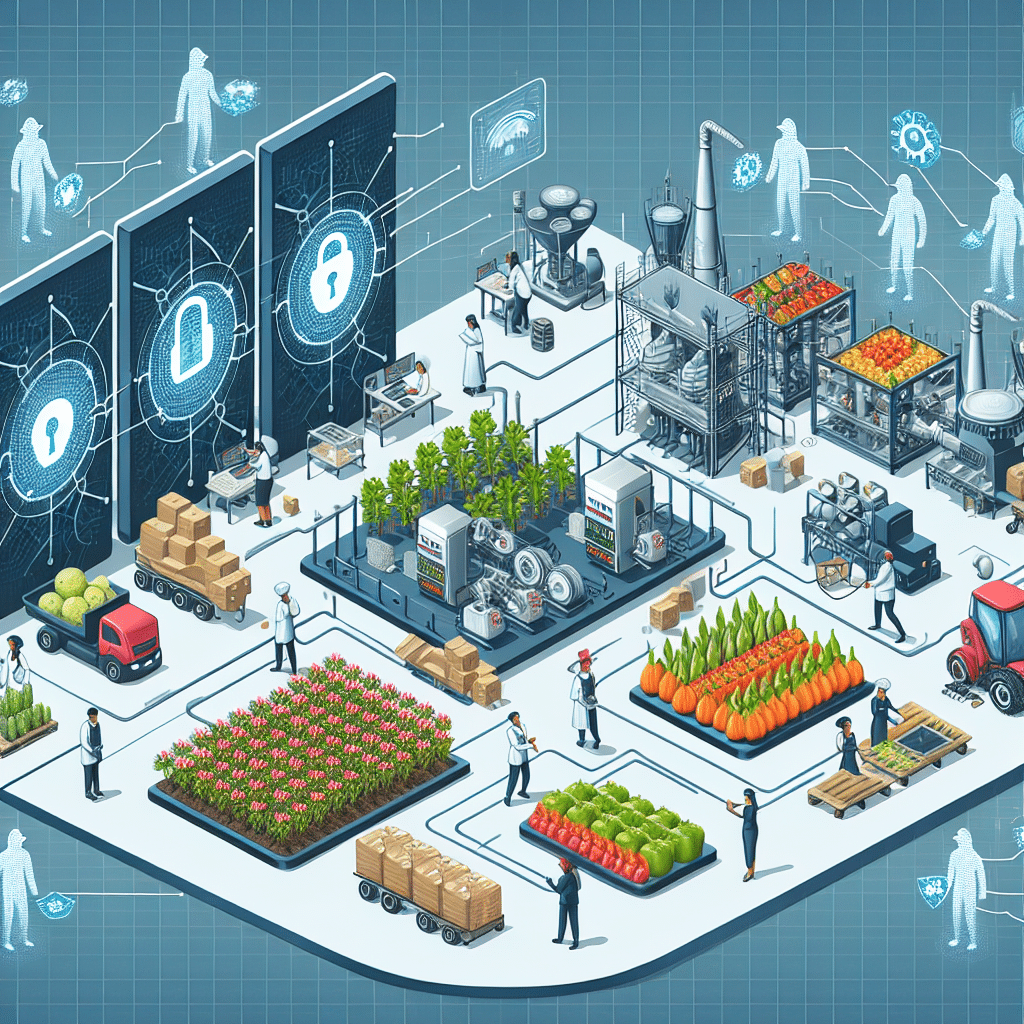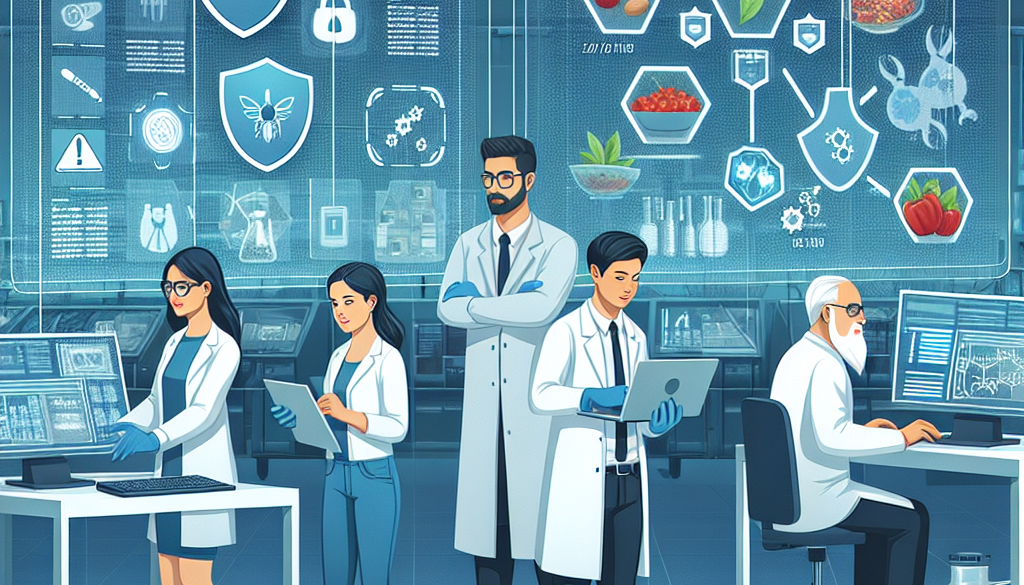Protection of Food Safety from Cyberattacks
-
Table of Contents
- Enhancing Food Safety: Strategies to Combat Cybersecurity Threats
- The Intersection of Cybersecurity and Food Safety
- Understanding the Risks: Cyberattacks in the Food Sector
- Statistics Highlighting the Threat
- Strategies for Protecting Food Safety from Cyberattacks
- Implement Robust Cybersecurity Measures
- Adopt a Risk Management Framework
- Ensure Supply Chain Security
- Develop an Incident Response Plan
- Collaborate with Government and Industry Partners
- Case Studies: Lessons Learned from Past Incidents
- Conclusion: Safeguarding Our Food Through Cybersecurity Vigilance
- ETprotein: Your Partner in Quality Protein Products
Enhancing Food Safety: Strategies to Combat Cybersecurity Threats

In an era where technology and automation are integral to the food industry, the threat of cyberattacks has become a significant concern. The reliance on digital systems for food production, processing, and distribution has opened up vulnerabilities that can be exploited by cybercriminals, potentially leading to widespread food safety issues. This article delves into the importance of protecting food safety from cyberattacks and outlines strategies to mitigate these risks.
The Intersection of Cybersecurity and Food Safety
The food industry is increasingly adopting technology to improve efficiency and productivity. From farm to fork, digital systems are used for inventory management, processing controls, quality assurance, and supply chain logistics. However, this digitization also means that a cyberattack could compromise critical systems, leading to contamination, production halts, and distribution of unsafe products.
Understanding the Risks: Cyberattacks in the Food Sector
Cyberattacks can take many forms, including malware, ransomware, data breaches, and Distributed Denial of Service (DDoS) attacks. The consequences of such attacks in the food industry can be severe, ranging from operational disruptions to health risks for consumers. For instance, a cyberattack on a food processing plant could result in the alteration of recipes or temperatures, leading to undercooked products and the potential spread of foodborne illnesses.
Statistics Highlighting the Threat
- A report by the Food Protection and Defense Institute noted that cyberattacks against the food and agriculture sector increased by 600% from 2019 to 2020.
- The FBI’s Cyber Division has identified the food and agriculture sector as a target for cybercriminals, emphasizing the need for enhanced cybersecurity measures.
Strategies for Protecting Food Safety from Cyberattacks
Ensuring the safety of food products in the face of cyber threats requires a multi-faceted approach. Below are key strategies that can help protect the food industry from cyberattacks:
Implement Robust Cybersecurity Measures
Food companies must invest in comprehensive cybersecurity solutions, including firewalls, intrusion detection systems, and regular software updates. Employee training on cybersecurity best practices is also crucial to prevent phishing and other social engineering attacks.
Adopt a Risk Management Framework
Organizations should adopt a risk management framework tailored to the food industry. This involves identifying critical assets, assessing vulnerabilities, and implementing controls to mitigate risks. Regular risk assessments can help organizations stay ahead of emerging threats.
Ensure Supply Chain Security
The food supply chain is a complex network that can be exploited by cybercriminals. Companies should work closely with suppliers to ensure they adhere to strict cybersecurity standards. This includes conducting audits and requiring cybersecurity certifications.
Develop an Incident Response Plan
In the event of a cyberattack, a well-defined incident response plan can minimize damage and restore operations quickly. This plan should outline the steps to be taken, including communication protocols and recovery procedures.
Collaborate with Government and Industry Partners
Collaboration with government agencies and industry partners can provide valuable insights into threat intelligence and best practices. Participating in information-sharing platforms can help companies stay informed about the latest cybersecurity trends and threats.
Case Studies: Lessons Learned from Past Incidents
Examining past cyberattacks on the food industry can provide valuable lessons. For example, a ransomware attack on a major meat processing company in 2021 led to the shutdown of several plants and highlighted the need for robust cybersecurity measures and contingency planning.
Conclusion: Safeguarding Our Food Through Cybersecurity Vigilance
The protection of food safety from cyberattacks is a critical issue that requires ongoing attention and investment. By implementing robust cybersecurity measures, adopting risk management frameworks, ensuring supply chain security, developing incident response plans, and collaborating with partners, the food industry can better protect itself against the growing threat of cyberattacks. The safety of our food supply depends on the industry’s ability to adapt and respond to these digital threats.
ETprotein: Your Partner in Quality Protein Products
In addition to safeguarding food safety through cybersecurity, it’s essential to choose suppliers that prioritize quality and safety in their products. ETprotein is a company that stands out in this regard, offering a range of high-quality protein products that are organic, non-GMO, and allergen-free. Their commitment to excellence makes them a reliable partner for businesses looking to source safe and nutritious protein ingredients.
About ETprotein:
ETprotein, a reputable protein and L-(+)-Ergothioneine (EGT) Chinese factory manufacturer and supplier, is renowned for producing, stocking, exporting, and delivering the highest quality organic bulk vegan proteins and L-(+)-Ergothioneine. They include Organic rice protein, clear rice protein, pea protein, clear pea protein, watermelon seed protein, pumpkin seed protein, sunflower seed protein, mung bean protein, peanut protein, and L-(+)-Ergothioneine EGT Pharmaceutical grade, L-(+)-Ergothioneine EGT food grade, L-(+)-Ergothioneine EGT cosmetic grade, L-(+)-Ergothioneine EGT reference grade and L-(+)-Ergothioneine EGT standard. Their offerings, characterized by a neutral taste, non-GMO, allergen-free attributes, with L-(+)-Ergothioneine purity over 98%, 99%, cater to a diverse range of industries. They serve nutraceutical, pharmaceutical, cosmeceutical, veterinary, as well as food and beverage finished product distributors, traders, and manufacturers across Europe, USA, Canada, Australia, Thailand, Japan, Korea, Brazil, and Chile, among others.
ETprotein specialization includes exporting and delivering tailor-made protein powder and finished nutritional supplements. Their extensive product range covers sectors like Food and Beverage, Sports Nutrition, Weight Management, Dietary Supplements, Health and Wellness Products, and Infant Formula, ensuring comprehensive solutions to meet all your protein needs.
As a trusted company by leading global food and beverage brands and Fortune 500 companies, ETprotein reinforces China’s reputation in the global arena. For more information or to sample their products, please contact them and email sales(at)ETprotein.com today.














